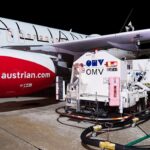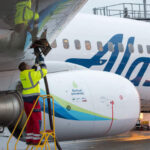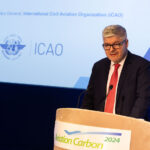A new study by UK-based consultancy CFP Energy has identified a significant divergence of strategies to decarbonise aviation in the UK, France and Germany, and serious impediments to the industry’s ability to reach its net zero emissions targets. The report, ‘Decarbonising the Future: Navigating ETS Reforms and Net Zero Solutions’, was based on surveys of chief financial officers and risk management professionals of more than 500 organisations in high-emission industries including aviation, shipping, construction, data centres and manufacturing. The study reflected strong uptake of measures including biofuels, green certificates and voluntary carbon credits. But of the aviation operators surveyed in the UK and Europe, 95% of respondents expect a rise in carbon allowance demand, while funding limitations and insufficient access to new technologies are highlighted as key barriers to progress.
“Between funding issues, regulations, knowledge gaps and a lack of technology, large-scale organisations face a mountain of issues to overcome,” said CFP Energy’s COO, Catherine Newman, commenting on the report.
The survey, commissioned by CFP and conducted by London-based research group 3Gem before the UN’s recent COP29 climate summit in Baku, Azerbaijan, focused on the urgent push to reduce carbon emissions, particularly in Europe, where intensified regulations and steep decarbonisation targets have been announced. In the aviation sector, respondents included airlines, airport operators and associated businesses.
Central to the survey was the European Union’s ‘Fit for 55’ reform programme, developed to reduce carbon emissions by enacting measures including the EU Emissions Trading System, which since 2012 has imposed ever-increasing limits on emissions from intra-Europe flights.
After Brexit, the UK introduced its own ETS, while France and Germany adopted customised approaches to reach net zero carbon emissions, complicating compliance for airlines operating in these markets.
A key concern for carriers that responded to the survey is the rapid reduction in free carbon allowances, which are due to be phased out in 2026, and both the scarcity and cost of future concessions. Based on 2010 benchmarks, airlines have previously received up to 82% of their carbon allowances for free. But this year they have been reduced by 25%, and next year will come down by 50% before they are abolished and replaced with a full auction system.
As well, the EU is considering expanding its ETS obligations by 2027 to also include non-CO2 emissions such as nitrous oxides and soot, both key elements of warming contrails produced by aircraft in specific conditions and coming under increasing global scrutiny.
The study found 95% of airline respondents in the UK and Europe expected a rise in demand for carbon allowances, but also identified significant barriers to their decarbonisation ambitions, with 61% highlighting funding limitations and 60% the insufficient availability of new technologies to help them reduce their carbon emissions.
As well, 54% of respondents identified knowledge gaps as impediments to reducing emissions, and 53% cited regulatory complexities.
But aviation operators still continued to pursue other decarbonisation technologies and products, the most popular being biofuels (53%) and voluntary carbon markets (51%), followed at 48% by power purchase agreements and green certificates (44%). The industry also indicated significant interest in alternative fuel sources, particularly hydrogen.
Most respondents to the survey (90%) said they had produced a plan to transition their businesses to net zero operations, through there were marked differences between the UK, Germany and France among those who said they were not meeting targets.
Of total respondents, 13% of those with transition plans were falling short of their targets. In France, 17% said they were underachieving, while in Germany 7% were behind.
“What is most interesting,” said Newman, “are the barriers that industry stakeholders attribute to holding their respective sectors back.
“We hope this report provides business leaders with actionable solutions to tackle decarbonisation amidst volatile conditions. The solutions to decarbonise exist, we simply need to provide better access to them.”
Tim Atkinson, CFP Energy’s Director of Sales and Structuring, said it was vital that businesses focused on changes needed to comply with evolving environmental regulations.
“It’s encouraging to see many of the survey participants are planning for rises in future ETS carbon prices and taking advantage of the flexibility carbon markets offer to manage rising compliance costs whilst technology challenges are addressed,” he said.
“It has never been more important for businesses to ensure they are prepared for the paradigm shift of tougher targets and higher carbon prices that is set to impact both the UK and EU emissions trading schemes over the next five to 10 years.”
















More News & Features
Progress on decarbonising the airline sector has been slow this year, says IATA chief
EASA releases status report on Europe’s SAF production and readiness to meet blending targets
UK government sets out new Jet Zero focus and launches consultation on CORSIA global emissions scheme
European and US research programmes expand to better understand aviation non-CO2 climate effects
T&E joins aviation and climate scientists in urging action to reduce warming contrails
Commentary: China’s fair and equitable solution to civil aviation’s climate challenge